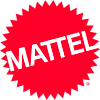Related Research Articles

Monopoly is a multi-player economics-themed board game. In the game, players roll two dice to move around the game board, buying and trading properties and developing them with houses and hotels. Players collect rent from their opponents and aim to drive them into bankruptcy. Money can also be gained or lost through Chance and Community Chest cards and tax squares. Players receive a stipend every time they pass "Go" and can end up in jail, from which they cannot move until they have met one of three conditions. House rules, hundreds of different editions, many spin-offs, and related media exist. Monopoly has become a part of international popular culture, having been licensed locally in more than 103 countries and printed in more than 37 languages. As of 2015, it was estimated that the game had sold 275 million copies worldwide.
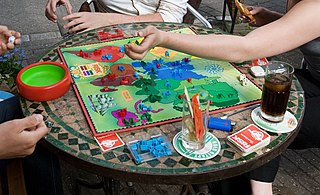
Risk is a strategy board game of diplomacy, conflict and conquest for two to six players. The standard version is played on a board depicting a political map of the world, divided into 42 territories, which are grouped into six continents. Turns rotate among players who control armies of playing pieces with which they attempt to capture territories from other players, with results determined by dice rolls. Players may form and dissolve alliances during the course of the game. The goal of the game is to occupy every territory on the board and, in doing so, eliminate the other players. The game can be lengthy, requiring several hours to multiple days to finish. European versions are structured so that each player has a limited "secret mission" objective that shortens the game.

Trivial Pursuit is a board game in which winning is determined by a player's ability to answer trivia and popular culture questions. Players move their pieces around a board, the squares they land on determining the subject of a question they are asked from a card. Each correct answer allows the player's turn to continue; a correct answer on one of the six "category headquarters" spaces earns a plastic wedge which is slotted into the answerer's playing piece. The object of the game is to collect all six wedges from each "category headquarters" space, and then return to the center "hub" space to answer a question in a category selected by the other players.
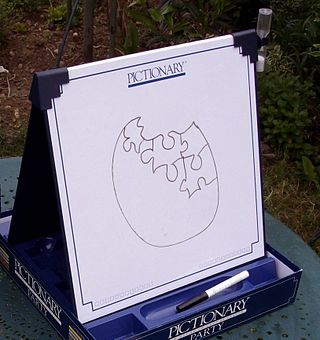
Pictionary is a charades-inspired word-guessing game invented by Robert Angel with graphic design by Gary Everson and first published in 1985 by Angel Games Inc. Angel Games licensed Pictionary to Western Publishing. Hasbro purchased the rights in 1994 after acquiring the games business of Western Publishing. Mattel acquired ownership of Pictionary in 2001. The game is played in teams with players trying to identify specific words from their teammates.

Card Sharks is an American television game show. It was created by Chester Feldman for Mark Goodson-Bill Todman Productions. The game features two contestants who attempt to predict the outcome of survey questions to gain control of a row of oversized playing cards, then determine whether the next card drawn is higher or lower. The title Card Sharks is a play on the term "card sharp", a person skilled at card games.

The Newlywed Game is an American television game show that puts newly married couples against each other in a series of revealing question rounds to determine how well the spouses know or do not know each other. The program, originally created by Robert "Nick" Nicholson and E. Roger Muir and produced by Chuck Barris, has appeared in many different versions since its 1966 debut. The show became famous for some of the arguments that couples had over incorrect answers in the form of mistaken predictions, and it even led to some divorces.

Name That Tune is an American television music game show. Originally created and produced by orchestra conductor Harry Salter and his wife Roberta Semple Salter, the series features contestants competing to correctly identify songs being played by an on-stage orchestra or band.

Taboo is a word, guessing, and party game published by Parker Brothers in 1989. The objective of the game is for a player to have their partners guess the word on the player's card without using the word itself or five additional words listed on the card.

Play Your Cards Right is a British television game show based on, and played similarly to, the American show Card Sharks.

Lingo is an American television game show with multiple international adaptations. In it, contestants compete to decode five-letter words given the first letter, similarly to Jotto, with each correctly guessed word earning number draws to attempt filling in a Bingo card.
Catch Phrase is a word guessing party game commercially available from Hasbro.
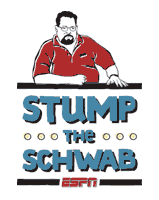
Stump the Schwab is an American game show that aired on ESPN2 and ESPN Classic from July 8, 2004 to September 29, 2006. The show featured three contestants trying to defeat Howie Schwab, ESPN's first statistician, in a sports trivia contest. Stuart Scott was the show's host. The show also appeared on Canada's The Score Television Network.

Bop It toys are a line of audio games. By following a series of commands issued through voice recordings produced by a speaker by the toy, which has multiple inputs including pressable buttons, pull handles, twisting cranks, spinnable wheels, flickable switches—the player progresses and the pace of the game increases.
Personal Preference is a 1987 board game created by Donal Carlston that involves guessing the order in which a player prefers foods, activities, people, and other items compared to one another. The game was published by Broderbund in the United States, Playtoy Industries in Canada, and Parker Brothers International in Britain.

Pass the Pigs is a commercial version of the dice game Pig, but using custom asymmetrical throwing dice, similar to shagai. It was created by David Moffatt and published by Recycled Paper Products as Pig Mania! in 1977. The publishing license was later sold to Milton Bradley and the game renamed Pass the Pigs. In 1992, publishing rights for North America were sold to Winning Moves Games USA, which acquired the game outright from David Moffat Enterprises in early 2017.
TriBond is a board game that has sold over 3 million copies in 14 countries since its release in 1990. It requires players to determine a common bond between three subjects. It follows in the tradition of Trivial Pursuit, Outburst and other adult boardgames that require a wide range of knowledge but TriBond requires some problem solving ability as well.
Family Game Night is an American television game show based on Hasbro's family of board games and EA's video game franchise of the same name. The show was hosted by Todd Newton. Burton Richardson was the announcer for the first two seasons; he was replaced by Stacey J. Aswad in the third season, and Andrew Kishino was hired for the fourth season. The 60-minute program debuted on October 10, 2010, on The Hub which was Discovery Kids. The network became Discovery Family on October 13, 2014; it was previewed on October 9, 2010, on its sister channel, TLC. Seasons 1 and 2 contained 26 and 30 episodes respectively. Seasons 3, 4 and 5 each contained 15 episodes. Season 2 premiered on Friday, September 2, 2011, with additional games being added. The games added to the second season included Cranium Brain Breaks, Green Scream, Ratuki Go-Round, Simon Flash, Operation Sam Dunk, Trouble Pop Quiz, and Spelling Bee. However games from the previous season were still kept.
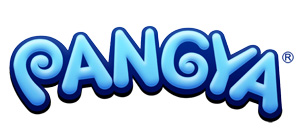
PangYa was an online multiplayer casual golf simulation game designed by Korean development company Ntreev Soft and NCSoft.

The Jackbox Party Pack is a series of party video games developed by Jackbox Games for many different platforms on a near-annual release schedule since 2014. Each installment contains five games that are designed to be played in groups of varying sizes, including in conjunction with streaming services like Twitch which provide means for audiences to participate.
Cluedo, known as Clue in North America, is a murder mystery-themed multimedia franchise started in 1949 with the manufacture of the Cluedo board game. The franchise has since expanded to film, television game shows, book series, computer games, board game spinoffs, a comic, a play, a musical, jigsaws, card games, and other media.
